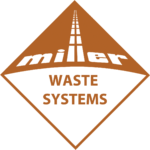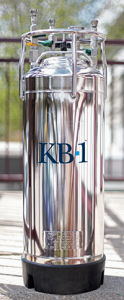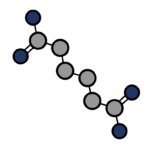As engineers and applied scientists, BioZone researchers understand the importance of translating academic research into real-world practice with positive societal impact.
Bioaugmentation Culture
The microbial cultures KB-1® and KB-1® Plus were developed in Dr. Edward’s lab to remediate sites contaminated by industrial chlorinated solvents. Chlorinated hydrocarbons can be highly toxic impacting the central nervous system and can cause liver and kidney damage.
The microbial cultures were commercialized as the remediation and testing company- SiREM. The KB-1 and KB-1 Plus cultures have now been used worldwide for over a decade to enhance bioremediation of chlorinated solvents including: Chlorinated ethenes, Chlorinated ethanes, Chlorinated methanes, Chlorinated propanes, RDX, and Chlorofluorocarbons.
Chemicals from renewable feedstocks - Ardra Bio
Through the Industrial Biocatalysis Network and other projects, BioZone researchers and students are identifying and optimizing enzymes and metabolic pathways that can transform renewable biomass into useful specialty chemicals and materials.
 Once such technology is being commercialized through a renewable chemicals startup called Ardra Bio. Ardra Bio's core technology is based on designer biochemical pathways that convert renewable biomass into high-value specialty and fine chemicals. Ardra Bio is currently using the technology to produce natural 1,3-butanediol from renewable green feedstocks that will replace petroleum-based 1,3-butanediol in cosmetics and personal care products. Using designer pathways, Ardra has further developed a portfolio of high-value natural flavour and fragrance ingredients.
Once such technology is being commercialized through a renewable chemicals startup called Ardra Bio. Ardra Bio's core technology is based on designer biochemical pathways that convert renewable biomass into high-value specialty and fine chemicals. Ardra Bio is currently using the technology to produce natural 1,3-butanediol from renewable green feedstocks that will replace petroleum-based 1,3-butanediol in cosmetics and personal care products. Using designer pathways, Ardra has further developed a portfolio of high-value natural flavour and fragrance ingredients.
Ardra Bio was incubated in the prestigious San Francisco-based Indie Bio-Accelerator and is now housed in JLabs at the MaRS Centre in Toronto. Ardra has received significant customer traction through offers for collaboration and co-development agreements for multiple products on its portfolio.
Processing Solid Organic Waste – Miller Waste Systems Inc.
BioZone researchers have developed and are testing new anaerobic digester designs that reduce the quantity of solid waste sent to landfills, produce renewable energy, lower the amount of greenhouse gases released into the environment, and  generate a compost by-product suitable for land application. The benefits are considerable; a reduction in organic waste to landfill by up to 80%, a reduction in GHG emissions of 1.25 tonnes of CO2 for every tonne of waste processed, and the production of commercial quantities of electricity or renewable natural gas.
generate a compost by-product suitable for land application. The benefits are considerable; a reduction in organic waste to landfill by up to 80%, a reduction in GHG emissions of 1.25 tonnes of CO2 for every tonne of waste processed, and the production of commercial quantities of electricity or renewable natural gas.
This reactor design will be tested at demonstration scale, and then full scale, at a new integrated waste management facility to be constructed in Ottawa by Taggart Miller a joint venture of The Miller Group and The Taggart Group.
CO2 to value added chemicals- Phycus Bio

Phycus Biotechnologies is a chemical production company spun out of BioZone that has at its core a biocatalyst platform for converting CO2 to produce a value-added chemicals. This platform represents one of the cheapest sources of feedstocks carbon today and thus is a game-changer for bio-product economics. Conventional bioprocess rely on sugar feedstocks. However the low cost of oil relative to the cost of sugar make the economics of producing chemicals from biomass unfavourable. Our process relies on using CO2 and renewable electricity as process inputs. Today, our process produces glycolic acid. Glycolic acid has a variety of uses: it is found in food packaging materials, medical polymers, cosmetics, paints and adhesives.
Life Cycle and Technoeconomic Assessment - Savant Technical Consulting
BioZone researchers launched and now operate Savant, a research-driven consulting company that provides world-leading expertise in the fields of microbiology and biotechnology, process and bio-process design, financial modeling, and life cycle assessment (LCA) for the renewable energy, environmental remediation, biofuels, and waste management industries.
Inventions
Some of the recent inventions from BioZone projects and researcher include:
- Novel pathways for production of diols and diacids (chemical precursors to replace petroleum feedstocks)
- Microbes engineered for 1,3-butanediol production
- Novel Enzymes for recycling of plastics made from Polylactic Acid
- Method to spatially and chemically resolve lignin from polysaccharides in woody samples
- Process for fortifying salt with iron and iodine (Double Fortified Salt)
- Three-dimensional tissue-scale modeling technology
Materials Transfer Agreements
BioZone uses standardized Material Transfer Agreements to share the commercially relevant enzymes and cultures it identifies with its industry partners. This process allows the industry partners to rapidly test and scale up useful enzymes for commercialization.
Education
BioZone has trained hundreds of graduate students post-docs. It is our goal to not only provide excellent technical training but to equip students with the tools needed to critically shape public discourse and policy creation.
To learn about BioZone Alumni visit: biozone.utoronto.ca/alumni/.
Social Benefits
BioZone research promotes sustainable and healthy environments by:
- developing biotechnologies to produce chemicals, materials, and biofuels using renewable biomass feedstocks rather than petroleum,
- identifying biocatalysts to replace chemical catalysts that rely on toxic compounds,
- promoting healthy populations through fortifying foods with essential nutrients,
- using microbial communities to clean up industrial contaminants,
- using enzymes and microbial communities to reduce and recycle waste,
- and developing biotechnologies to reduce carbon emissions.




